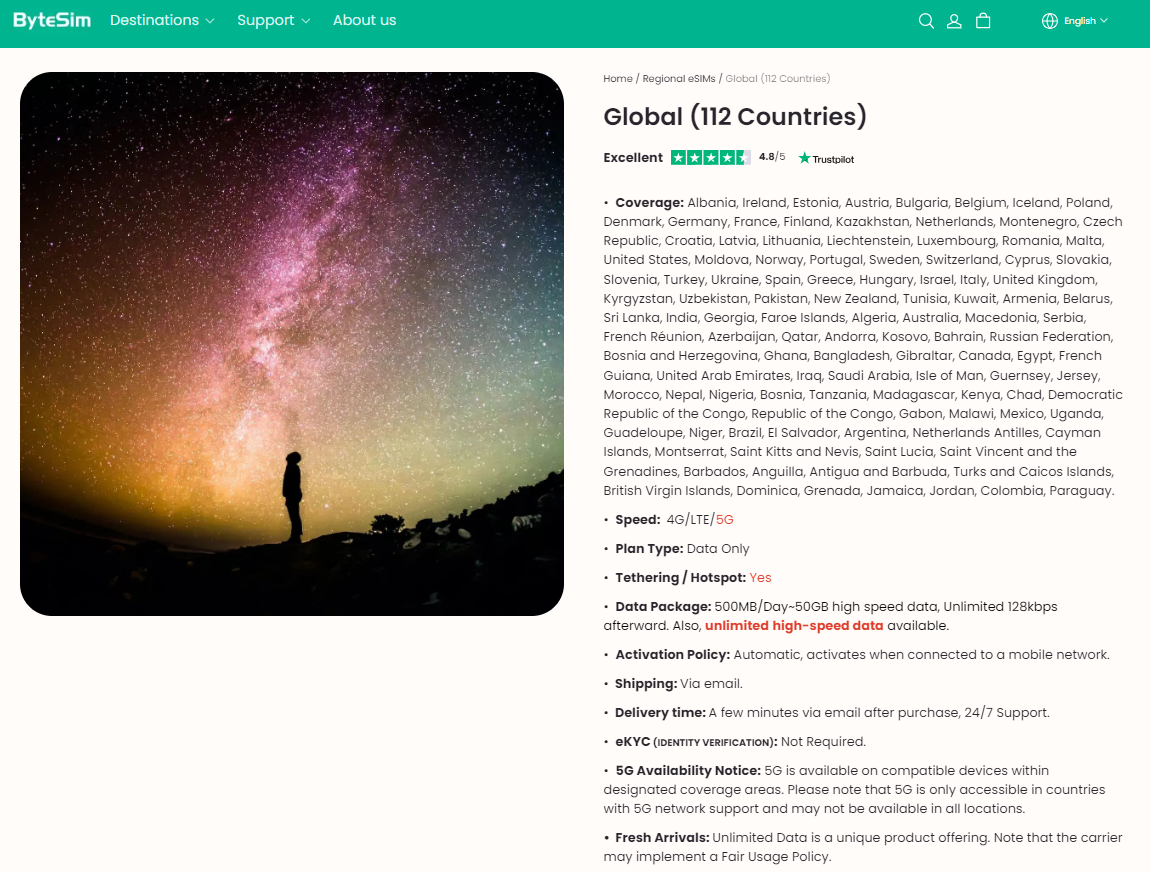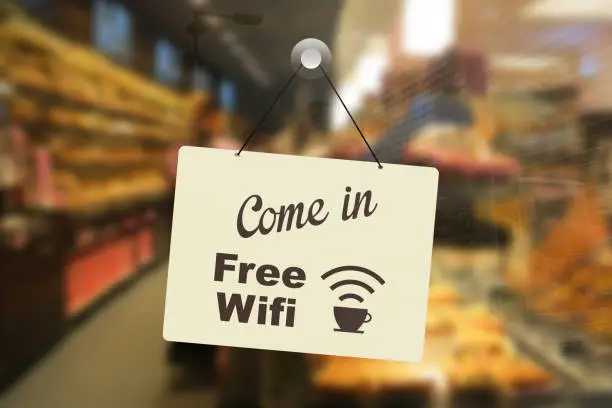Best Ways to Stay Connected Worldwide
Sep 09,2024 | Snowdust
Table of contents
Ways to stay connected while traveling abroad
- ByteSIM’s eSIMs
- Local SIM cards
- Portable WiFi devices
- Roaming internet
- Free WiFi in public places
- Prepaid data cards
- Satellite connection
The perfect option for an internet connection
FAQ about worldwide internet access
Would you be planning your next trip? When planning to travel abroad, staying connected to the internet is crucial for navigating unfamiliar places, staying in touch with loved ones, and sharing your travel experiences. Various options are available to ensure you have internet access no matter where you go.
In this guide, we’ll explore the best ways to stay connected, from eSIMs to satellite connections, and help you choose the right option for your needs.
Ways to stay connected while traveling abroad
Getting access to the Internet while traveling internationally can be achieved through various means, but not all options are cost-effective or suitable for everyone. Here are some of the best options for staying connected while on the road.
We understand the importance of global communication in today's world, especially with the prevalent use of social media. Even while traveling, it's essential to consider staying connected. Each alternative allows us to stay connected using our mobile phones and other devices.
ByteSIM’s eSIMs
When it comes to traveling, an eSIM is an excellent option. It offers unmatched flexibility, allowing you to switch between mobile data plans without the need for a physical SIM card. With an eSIM, you have the freedom to connect to local networks in different countries, eliminating the need for physical SIM cards or expensive roaming charges.
ByteSIM provides eSIM services in over 200 destinations globally, with many offering unlimited data options, including South Korea, China, the USA, Canada, various European countries, and the UK. Also, data plans support data sharing across multiple devices. Additionally, some eSIM offerings will incorporate traditional calling minutes. This comprehensive coverage ensures seamless global internet usage for our clientele.

Before you get an eSIM, it's a good idea to check if your device is compatible and unlocked. If not, you might have trouble using it abroad. Even if you're in a remote place, ByteSIM has got you covered with alternative options!
Local SIM cards
Local SIM cards are a convenient option for accessing the worldwide internet. However, they may not be the most practical choice when traveling to a country with a different language or culture. Purchasing a local SIM card requires you to visit a cellphone store in person, which can be inconvenient, especially in an unfamiliar location.
While it's possible to find SIM cards at the airport, it's more common to purchase them at shopping malls or phone company offices. This may inconvenience you initially by delaying your access to the internet during the first few hours of your trip.
| Advantages | Disadvantages |
| Local numbers for locals to reach you and grants access to local deals and services. | Inconvenience: Requires you to locate a vendor, purchase a SIM card, and possibly set up a new plan. |
| Cost-effective: Often significantly cheaper than using roaming services from your home carrier. | Compatibility: Your phone must be unlocked and compatible with the local network's frequencies. |
| Accessibility: Local SIM cards are widely available at airports. | Limited coverage: May not provide service in remote regions. |
| Faster speeds: Local networks often prioritize their own users. | Language barrier: Instructions and customer service may only be available in the local language. |
Portable WiFi devices
If you require internet access while traveling, consider renting a Pocket WiFi for convenient and reliable connectivity. However, be aware that renting these devices entails additional costs such as shipping, insurance, data plans, and rental fees.
It's crucial to understand that connecting multiple devices to the Pocket WiFi may impact your internet speed and performance. It's imperative to thoroughly review the usage policies with the provider to avoid any complications.
In the unfortunate event of theft, damage, or loss, the service company will impose a significant fine of up to USD 300. Additionally, keep in mind that opting for a Pocket WiFi rental is generally more expensive than alternative options such as purchasing a virtual SIM or eSIM.
| Advantages | Disadvantages |
| Security: Provides a private Wi-Fi network, offering better security than public Wi-Fi. | Coverage: Depends on cellular networks, so coverage may be limited in some areas. |
| No Contracts: Typically offers prepaid plans without requiring a long-term commitment. | Data Limits: Data packages may have caps, and exceeding them can result in extra charges. |
| Multiple Connections: Connecting multiple devices at once, makes it perfect for families or groups. | Extra Device: Adds a device to carry and manage, potentially increasing your travel load. |
Roaming internet
Roaming is like your phone's passport to international coverage, provided by local cellular operators. Just remember, the terms and conditions will vary based on your current operator or the one you have a phone subscription within your country.
Using roaming might be the easiest way to stay connected abroad, but it can be pricey and give travelers a headache with the high costs. The resulting bills could be ten times more expensive than other options for getting internet service abroad. Some companies might even charge up to $12 per GB consumed.
| Advantages | Disadvantages |
| Global Coverage: Typically provides broader network coverage compared to local SIM cards. | Speed: Roaming connections may be slower compared to local networks. |
| Peace of Mind: Eliminates the need to search for and configure a local SIM card. | Cost: Roaming fees can be steep, with data often charged at significantly higher rates than your home plan. |
| Familiar Interface: Allows you to use your existing phone number and data plan without the need for additional setup. | Limited Data: Many roaming plans come with data caps that can be easily surpassed with regular internet usage. |
>You may want to know what is data roaming.<
Free WiFi in public places
If you're traveling on a tight budget and need internet access, public WiFi networks in locations like cafés, restaurants, hotels, airports, and malls can be a convenient option.

However, these networks are open to anyone, making them less secure and potentially risky. Hackers can use them to spread viruses or malware, and personal data could be at risk. To stay safe, limit your use of public WiFi for general browsing and avoid accessing sensitive information like your email or bank accounts. For added protection, consider using a VPN to secure your connection while using public WiFi.
| Advantages | Disadvantages |
| Discovery: Offers access to local information and resources. | Security Risks: Unsecured networks can leave your data vulnerable to hackers and malware. |
| Social Interaction: Allows for online communication and entertainment, creating opportunities to connect with others. | Speed and Reliability: Connections can be slow and inconsistent, especially when many users are online or if the infrastructure is weak. |
| Cost-effectiveness: Public Wi-Fi is typically free, helping you conserve your mobile data and avoid roaming fees. | Privacy Concerns: Your online activity may be monitored or tracked by the network operators or third parties. |
Prepaid data cards
In some countries, prepaid data cards or tourist-specific SIM cards are available, though they are becoming less common.
These cards provide a set amount of data based on the plan you choose, allowing you to stay connected with loved ones without committing to a long-term contract with a telecom provider. However, once the data or period associated with the card expires, you typically can't renew or extend the data usage.
Satellite connection
Satellite internet is a type of internet connection that relies on satellites orbiting the Earth to send and receive data signals. Unlike traditional internet options that use cables or cell towers, satellite internet can reach remote and underserved areas where conventional infrastructure is lacking or non-existent.

While this option is less versatile compared to others, it excels in providing connectivity in remote locations where other methods fail. It's important to note that satellite internet requires specialized equipment, such as an antenna, router, and modem, making it a more long-term solution.
Overall, satellite internet is a valuable option for maintaining connectivity in remote areas. However, it's crucial to consider its limitations, costs, and technical requirements before choosing this method.
The perfect option for an internet connection
Picture being connected to the internet no matter where you are – whether it's on a tropical island or in a bustling European city. Sounds amazing, doesn't it? What if we told you that it's not just a dream, but a reality? ByteSIM's eSIM is the ultimate choice for global internet access, providing numerous advantages and benefits that set it apart from other options. Let's delve into the key advantages and disadvantages.
Advantages
1. 5G Unlimited Data: Experience the fastest native 5G networks in supported regions.
Enjoy seamless browsing, streaming, and downloading with unlimited 5G data. Whether you're navigating new cities or staying connected with loved ones, our service ensures you experience the highest speeds available in regions with 5G coverage.
2. Global Coverage: Connect in more than 200 countries and regions worldwide.
Stay connected wherever your travels take you. Our service provides reliable internet access across over 200 countries and regions, ensuring you never miss an important update, no matter how far from home you are.
3. No Hidden Costs: Easy online purchase with no retail stores or inflated prices.
Simplify your travel planning with transparent pricing and hassle-free online purchases. Avoid unexpected charges and inflated retail prices—what you see is what you pay, with no hidden fees.
4. Money Back Guarantee: Your satisfaction is our priority.
Travel with confidence knowing that if our service doesn't meet your expectations, you're protected by our money-back guarantee. Your satisfaction is our top priority, and we stand by the quality of our service.
5. 24/7 Customer Support: We're here to help anytime, anywhere.
Whether you’re facing connectivity issues or have questions about your service, our dedicated customer support team is available 24/7. No matter the time zone, we're here to assist you anytime, anywhere, ensuring you stay connected without interruption.
Disadvantages
Not all devices are compatible with eSIM, so it's a good idea to check if your smartphone supports eSIM and remains unlocked
FAQ about worldwide internet access
Do I need to have internet access while traveling worldwide?
Yes, because internet access will help you to keep in touch with your family and friends, look online for information, use browsing apps, book your accommodation or special activities, and access your bank accounts or social networks, among other things.
Can I use my home carrier’s service abroad?
Yes, most carriers offer international roaming services, but they can be expensive. Check for any available international data packages like ByteSIM eSIM to reduce costs.
What is an eSIM, and how can I get one?
An eSIM is a digital SIM that allows you to activate a cellular plan without the need for a physical SIM card. Many carriers and third-party providers, such as ByteSIM, offer eSIM plans that you can purchase and activate before or during your trip to Europe. This option is convenient and often cheaper than traditional roaming.



